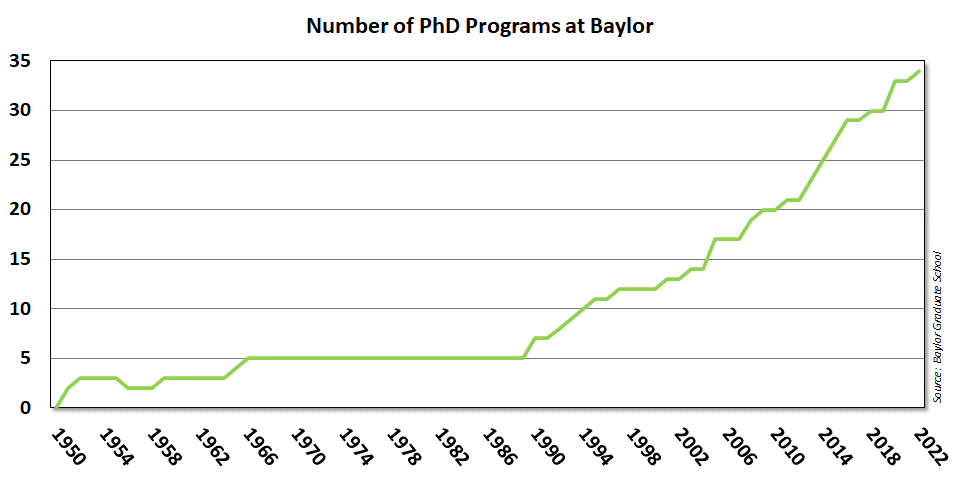Research Doctoral Degrees
Research Doctoral Degrees and “Preeminent” Research Status
Dean Larry Lyon with Rachel E.M. Johnson
As early as 2002, Baylor Vision 2012 proclaimed our aspiration to “have a depth of scholarly excellence and a volume of scholarly output that is found only in schools with first-rate graduate programs.” In 2012, Pro Futuris added specificity to our aspirations by seeking “Carnegie’s Research University with Very High Research Activity” as a goal. Most recently, in 2018, Illuminate succinctly and ambitiously proclaimed Baylor’s “aspiration to become America’s preeminent Christian research university.”
A major marker on Baylor’s path to becoming “America’s preeminent Christian research university” is the Carnegie Classification’s status of a “university with very high research activity” or R1. R1, a status we achieved in December of 2021, is the highest research category in the Carnegie taxonomy and was a challenging and worthy goal for Baylor. An R1 status may not be sufficient for research “preeminence,” but it is absolutely necessary. No university can achieve preeminence in research without first achieving an R1 classification.
Research Doctorates: The PhD in STEM, the Humanities, and the Social Sciences
Increasing our number of research doctorates—a degree requiring advanced study and a dissertation or similar project of original work—has been especially important for Baylor achieving an R1 Carnegie status. Higher numbers of graduates with research doctoral degrees moved us to R1. The most common research doctoral degrees are the doctorates of philosophy—the PhDs. For R1 classifications, PhDs are divided into three categories—STEM (Science, Technology, Engineering, Mathematics), Humanities, and the Social Sciences, and each university is ranked by the number of graduates in each category. In relation to most R1 universities, Baylor is especially low in STEM graduates, but as we will show, that is changing.
Long-term projections of Baylor’s PhD production are difficult, but short-term projections, say for five years ahead, are a relatively straightforward modeling exercise that applies past graduation patterns to current enrollment. The following table shows that our annual STEM graduation count should grow from 50 to 68 in the next five years. Little growth in predicted for the social sciences between now and 2026, though our recruitment strategies suggest greater growth in the subsequent five years (2031). The annual humanities count should remain at about 23, reflecting student and faculty concerns about the academic job market.
PhD Program Enrollment, Graduation, and Projected Graduation Counts
STEM Programs
| PhD Program | 2021 Enrollment | Annual PhD Graduates: Current1 | Annual PhD Graduates: 20262 |
|---|---|---|---|
| Biology (PhD) | 60 | 3.3 | 6 |
| Biomedical Studies (PhD)3 | 9 | 3 | 0 |
| Chemistry & Biochemistry (PhD) | 87 | 8 | 10 |
| Computer Science (PhD) | 17 | 0 | 3 |
| Ecological, Earth & Env. Science (PhD)3 | 4 | 0.3 | 0 |
| Electrical and Computer Engineering (PhD) | 33 | 3.7 | 5 |
| ENS/ENPH/KENHP (PhD) | 15 | 4.7 | 5 |
| Environmental Science (PhD) | 38 | 2.7 | 6 |
| Geology (PhD) | 33 | 4 | 5 |
| Information Systems (PhD) | 5 | 1 | 1 |
| Mathematics (PhD) | 33 | 4.3 | 5 |
| Mechanical Engineering (PhD) | 36 | 3.3 | 9 |
| Physics (PhD) | 46 | 6 | 7 |
| Statistical Science (PhD) | 31 | 5.7 | 6 |
| Total | 447 | 50 | 68 |
Humanities Programs
| PhD Program | 2021 Enrollment | Annual PhD Graduates: Current1 | Annual PhD Graduates: 20262 |
|---|---|---|---|
| Church Music (PhD) | 6 | 0.7 | 1 |
| English (PhD) | 36 | 9.3 | 7 |
| History (PhD) | 21 | 2.7 | 4 |
| Philosophy (PhD) | 33 | 3.3 | 4 |
| Religion (PhD) | 56 | 6.7 | 7 |
| Total | 152 | 22.7 | 23 |
Social Sciences Programs
| PhD Program | 2021 Enrollment | Annual PhD Graduates: Current1 | Annual PhD Graduates: 20262 |
|---|---|---|---|
| Educational Psychology (PhD) | 25 | 3 | 4 |
| Political Science (PhD) | 26 | 3.3 | 3 |
| Psychology and Neuroscience (PhD) | 26 | 3.7 | 4 |
| Sociology (PhD) | 28 | 3 | 4 |
| Total | 105 | 13 | 15 |
Other Programs
| PhD Program | 2021 Enrollment | Annual PhD Graduates: Current1 | Annual PhD Graduates: 20262 |
|---|---|---|---|
| Curriculum & Teaching (PhD) | 19 | 3 | 4 |
| Entrepreneurship (PhD) | 5 | 1 | 1 |
| Health Services Research (PhD) | 5 | 0.3 | 1 |
| Higher Education Studies & Leadership (PhD) | 16 | 1.3 | 4 |
| Public Health (PhD) | 0 | 0 | 3 |
| Social Work (PhD) | 19 | 3 | 4 |
| Total | 64 | 8.6 | 17 |
All PhD Program Totals
| 2021 Enrollment | Annual PhD Graduates: Current1 | Annual PhD Graduates: 20262 | |
|---|---|---|---|
| GRAND TOTAL | 768 | 94 | 123 |
While we have already graduated enough PhDs to secure our R1 ranking, in the next five years (2026) we should grow from graduating 94 PhDs per year to approximately 123 graduates, a 30% increase. By 2026, in the Humanities and in the Social Sciences, we should be well within the lower range of R1 universities in research doctoral production. For STEM, while we will still be lagging behind the production of most R1s, that gap will be closing.
When combined with professional research doctorates like the Doctor of Education (EdD) and the Doctor of Science (DSc), this PhD growth rate helped move Baylor from R2 into the lower levels of an R1 classification. This is no small accomplishment, an accomplishment that I did not expect to see during my time at Baylor. However, a comparison with major research universities shows that a “preeminent” or “Tier 1” level for Baylor will require many more PhDs than our current projections. With that in mind, let’s consider three ways that Baylor can grow its number of PhD graduates.
Increasing PhD Production
The first and most efficient method of increasing PhD production is reducing attrition and graduating more of our current students. We already exceed the national average PhD degree completion rate for R2 universities, but our R1 goal is higher still. If we can reach the retention/completion rates of the best research universities, we could increase our total graduates by about 20% without increasing enrollment. This is a goal for our Graduate School.
A second and popular approach is to add more PhD programs. The table below shows that this is a strategy Baylor has aggressively followed since the 1990s, with a current count of 34 PhD programs which raises the question: How many more PhD programs does Baylor need? Compared to the 36 PhD programs at Notre Dame, a Christian university with strong R1 credentials, we are approaching a sufficient number. However, additional proposals for new PhD programs are in discussion, and a new PhD in Public Health was added this year. So, while PhD programs will be added in the future, most of Baylor’s growth in PhD production will not come from new programs. There are simply not that many left to add.
History of PhD Programs at Baylor
| 1951 - English | 2008 - Ecological, Earth & Environmental Sciences |
| 1951 - Education (discontinued 1956) | 2008 - Information Systems |
| 1952 - Chemistry | 2009 - Curriculum & Teaching |
| 1959 - Psychology | 2011 - Electrical & Computer Engineering |
| 1965 - Religion | 2011 - History |
| 1965 - Physics | 2013 - Church Music |
| 1990 - Biomedical Studies | 2013 - Social Work |
| 1990 - Geology | 2014 - Higher Education Studies & Leadership |
| 1992 - Statistical Science | 2014 - Mechanical Engineering |
| 1993 - Church-State Studies (discontinued 2011) | 2015 - Environmental Science |
| 1994 - Biology | 2015 - Entrepreneurship |
| 1995 - Sociology | 2016 - Computer Science |
| 1997 - Educational Psychology | 2016 - Health Services Research |
| 2001 - Mathematics | 2018 - Preaching |
| 2003 - Philosophy | 2020 - Communication Sciences & Disorders |
| 2005 - Religion, Politics & Society (discontinued 2011) | 2020 - School Psychology |
| 2005 - Kinesiology, Exercise Nutrition & Health Promotion | 2020 - Anthropology |
| 2005 - Political Science | 2021 - Public Health |
A third and especially promising path to Tier 1 status is growing our existing PhD programs. Here the Notre Dame comparison can again be instructive. Even though the number of Baylor and Notre Dame PhD programs is almost the same, Notre Dame graduates about twice as many PhDs as Baylor and has twice as many faculty in their PhD programs. This Notre Dame comparison can extend more broadly. Nationally, PhD programs in R1 universities tend to be about twice the size of Baylor’s programs. For the R1 and especially for the “Tier 1/Preeminent Research University” status to which we aspire, more faculty and more doctoral students in our PhD programs is a necessity.
Professional Research Doctorates
Not all PhDs are in the three main disciplinary areas of STEM, Humanities, and Social Sciences; some are in more professional areas. At Baylor, that would include PhDs in Curriculum and Teaching, Entrepreneurship, Health Services Research, Higher Education Studies and Leadership, and Social Work. Carnegie groups programs like these in an “Other” category along with non-PhD professional doctoral degrees such as the Doctor of Education (EdD), the Doctor of Psychology (PsyD), the Doctor of Musical Arts (DMA) and the Doctor of Science (DSc). These programs typically require a graduate degree prior to admission as well as a significant final research project. Thus, they are classified as research doctoral degrees and count toward our R1 status. Historically, these professional degrees have accounted for a significant number of our research doctoral graduates, contributing between 35-50 annual graduates toward Baylor’s total. However, that contribution will grow considerably in 2022, when the full impact of our new online EdD in Learning and Organization Change (EdD/LOC) swells our total research doctoral count.
The aforementioned EdD/LOC degree has been a remarkable success, currently enrolling over 500 students. As these cohorts begin to graduate, the effect on our total count of research doctorates will be substantial. Launching the EdD/LOC was a major challenge for our School of Education. The combined size and complexity of this program was without precedent at Baylor, but I am pleased to report that the initial planning and subsequent implementation by our Education faculty and staff was exceptional. I can also report that the research-based “Problems of Practice” projects that conclude the three-year program are consistently strong.
All of our research doctorate programs play a significant role in graduate education at Baylor, and all helped us move to R1. And more importantly, as the highest degree a university can offer, our doctoral programs help create the distinctive, defining characteristic of Baylor: A Preeminent Christian Research University.
[1][2][3]
[1] Three-year annual average (Summer 2018-Spring 2021)
[2] Projected for 2025-26
[3] Program is being phased out

